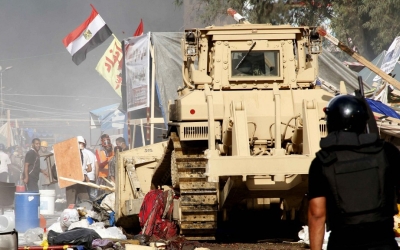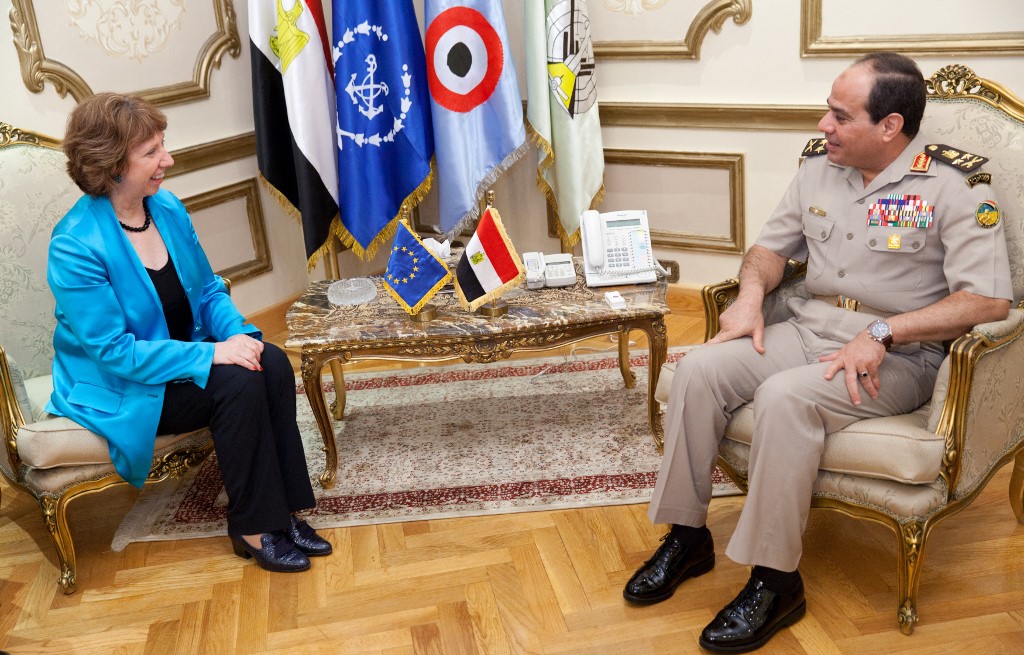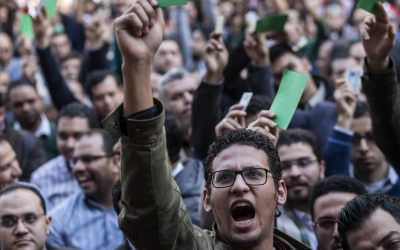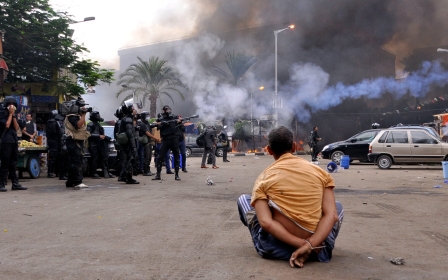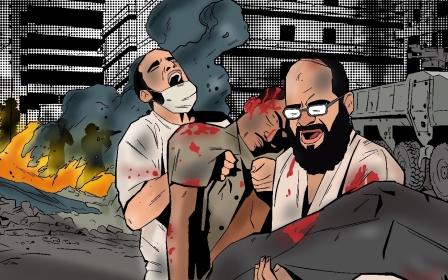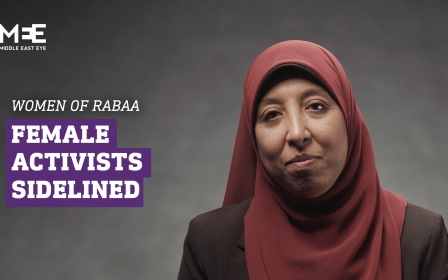The curse of Rabaa
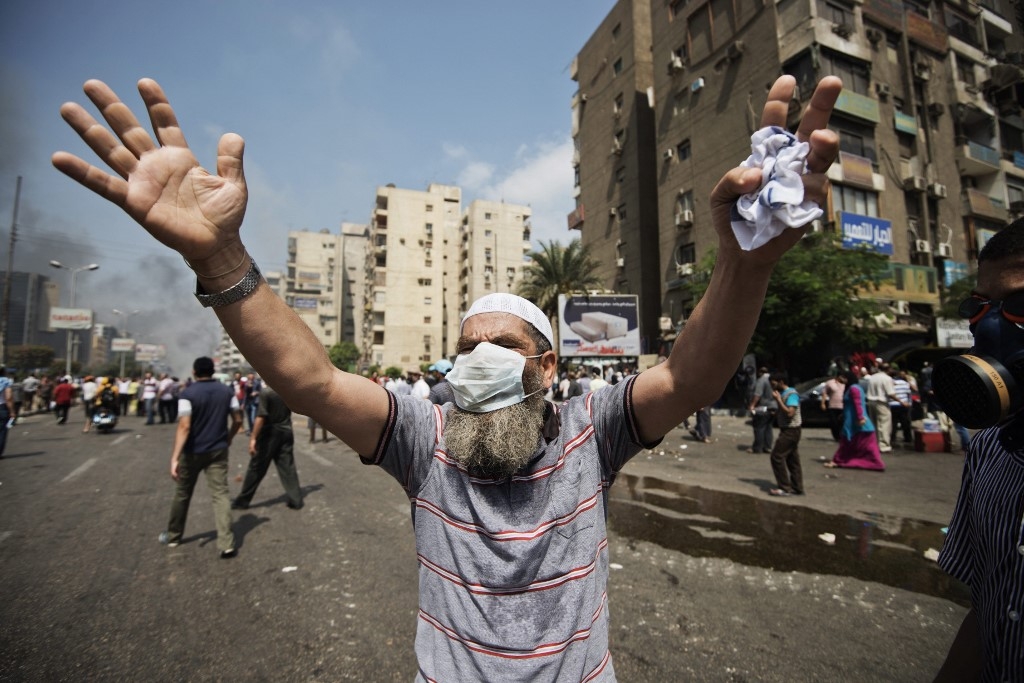
Ten years ago today, the worst massacre in modern Egyptian history took place in real-time before the world’s eyes. Anywhere between 900 and over 1,000 Egyptians were killed when two city-centre squares were cleared by police and troops using tear gas and live fire.
The Egyptian interior ministry had planned for three to five times that number of deaths, according to contemporary Egyptian newspaper reports.
Human Rights Watch, in an exhaustive investigation, likened the massacre to Tiananmen Square, where Chinese government forces killed between 400-800 protesters (although some estimates put the fatalities in the thousands) between 3-4 June 1989, and the Andijan massacre in Uzbekistan in 2005.
But unlike either, the clearance of the sit-ins at Rabaa and al-Nahda squares were treated at the time - and still are 10 years on - with domestic denial and international indifference.
And yet Rabaa was not just a massacre. It marked the end of the Arab Spring, a two-year revolution, which spread like wildfire throughout the Arab world and which threatened to unseat every absolute ruler in the region.
Stay informed with MEE's newsletters
Sign up to get the latest alerts, insights and analysis, starting with Turkey Unpacked
But it also had a profound impact on the region’s most populous state. Rabaa projected Egypt into a decade-long social, economic and political decline from which it shows no sign of recovering.
If the curse of the pharaohs was alleged to have struck the archaeologists who violated their tombs, the curse of Rabaa has plunged a whole nation into terminal decline.
Almost a spectator sport
No Egyptian has been left untouched by what took place that day in Cairo.
Ten years ago, the clearances of the two squares were popular events, almost a spectator sport. The deed was cheered. The mood lightened in downtown Cairo as traffic resumed through this mortuary.
In the run-up to the massacre, all left-wing political organisations, except the Revolutionary Socialists, issued a statement, demanding the crushing of the sit-ins by Islamist supporters of the deposed Mohamed Morsi.
The government had promised the “dispersal” of the sit-ins, and the left accused it of cowardice. “Where is the dispersal?” the statement was entitled. This sentiment was shared by secular liberals.
Hossam el-Hamalawy, a journalist and activist who played a key role in the revolution of 2011, well remembers the mood among the Egyptian left.
“Most of the left-wing organisations in Egypt regarded Islamists as fascists. They lumped the Muslim Brotherhood and radical jihadis in one basket and used to claim the relationship between the two is a division of labour," he said. "One could excommunicate and the other would assassinate.
“The left supported not just Rabaa, but all the killings that happened after the coup. They framed it as a war on fascism. Some of them came up with the rationalisation that it was two wings of the counter-revolution fighting each other. 'It's not our fight, so let them finish each other off'.”
But that is not what happened. After the generals had finished off the Brotherhood, they turned their fire on the left, and they soon ended up in the same cells as the Brotherhood. Some paid for their support of the military with their lives. Others languish in prison to this day.
“History will never forgive them. And I don't think that any of them actually has issued a statement of apology for their position regarding Rabaa," Hamalawy told Middle East Eye in an extended interview from his new home in Berlin.
"And the sad thing is that if they had their time again, they would repeat the same mistake.”
Egyptians on the streets who thought the army would hand them back power, having saved the nation from Islamist rule, proved to be suicidally wrong
Not every actor behaved like this. To his credit, the political face of the military coup, Nobel prize laureate Mohammed el-Baradei, resigned his post as vice president for foreign affairs on the day the massacre took place. He fled Egypt for Vienna.
In his resignation letter, he said: "I cannot bear the responsibility for a single drop of blood before God, before my own conscience or the citizens.”
He was widely denounced as a traitor for doing so.
Egyptians on the streets who thought that the army would hand them back power, having saved the nation from Islamist rule, proved to be suicidally wrong.
The blood of Rabaa was to lead Egypt on the road to perdition.
'People are angry'
Strange things were happening in 2013 before the military coup, to set the scene for the showdown that was to follow. There were unexplained electricity shortages during the hot summer month of June. There were shortages, too, of gas. The police disappeared off the streets. Petty criminals were free to roam.
We know now that these shortages were orchestrated by military intelligence, who put the word out that Morsi’s presidency was to be sabotaged.
Tamarod, or "Rebellion", which was initially portrayed as a grass-roots movement assembling a petition calling for Morsi’s removal, turned out to be no such thing. Leaked audio recordings revealed that Tamarod’s leadership was drawing on a bank account administered by the generals and paid for by the United Arab Emirates.
But during and after Rabaa, it was still widely believed as the voice of the people.
On 15 August, the day after the massacre, Tamarod urged its followers to be on the lookout for Brotherhood reprisals. Its founder and spokesperson, Mahmoud Badr, said: "Just as you met our calls to take to the streets on 30 June, today we ask you to meet our calls and form neighbourhood watches tomorrow. Our country is facing huge threats.”
Ten years on, the electricity and gas shortages during this summer’s heatwaves are real, not manufactured. In temperatures ranging from 40C to 50C, there have been power cuts lasting six hours. Street lighting has also been cut.
Mohammed Younis, an Egyptian-based energy researcher, told MEE: “People are angry. Even public figures who were neutral about the government have started to criticise the power cuts.”
The Egyptian Electricity Holding Company (EEHC) even issued a statement calling on people to avoid using elevators, in order to avoid being trapped in them due to power cuts.
'Believe me and believe only in me,' Sisi told Egyptians when he was made president. For a time, they did believe in him and now they are paying grievously for that belief
Abdel Fattah el-Sisi, who led the coup against Morsi in 2013 and has been president of Egypt since 2014, has bankrupted the country.
Food inflation is running at 60 percent and a similar percentage of the population is now classified as poor. The Egyptian pound has lost nearly 50 percent of its value against the dollar in a series of devaluations since March 2022. In 2013, the rate was one dollar to seven Egyptian pounds. Today it is 30 pounds.
According to the Fitch 2023 forecasts, Egypt is now spending 44 percent of its revenues on debt interest payments. Next year this will jump to 54 percent, putting it third in the world only after Sri Lanka and Pakistan.
An indication of how quickly Egypt's national debt is rising is shown by projections for the next five years. Between 2023 and 2028, it is forecast to increase by nearly 70 percent.
In 2028 the national debt will have grown to $510.32bn, an increase of $210bn over the coming five years.
“Believe me and believe only in me,” Sisi told Egyptians repeatedly when he was made president. For a time, they did believe in him and now they are paying grievously for that belief.
Migration surge
Egypt now exports its human misery around the Mediterranean. The current surge of migration to Italy includes a significant number of Egyptians, who now account for one in five disembarkations.
According to data from Frontex, the European border agency, Egyptians were the most common nationality along the central Mediterranean route into the EU in the first five months of 2022. This has been confirmed by the International Organisation for Migration, which counted nearly 22,000 Egyptian migrants arriving in Europe last year.
Last year, migrants from Egypt surpassed illegal migrants from every other nation, including those from Afghanistan and Syria.
This puts the Gulf countries that bankrolled the coup 10 years ago in a bind. For a start, the alliance that crushed the Arab Spring highly effectively has fractured.
Saudi Arabia, having seen its jihad fail against Turkey and Qatar, who supported the Muslim Brotherhood and other Islamist movements in Palestine, Libya and Syria, is back talking to, and investing in, Turkey once more.
The two architects of the counter-revolution, Mohammed bin Zayed, president of the UAE, and Mohammed bin Salman (MBS), crown prince of Saudi Arabia, are today at each other’s throats.
The Saudis were the first to break the blockade against Qatar and did so without consulting the Emiratis. However, MBS is less free to do a similar U-turn on Egypt.
He is fully aware that Egypt under the control of the army is a bottomless pit. But if he stopped financing Sisi and Egypt collapsed, he knows an exodus of Egyptians would come his way across the Red Sea.
If MBS was worried about the effect that the Sudan civil war could have on the west of his kingdom, where all his futuristic construction and investment are, he must be doubly concerned about the blowback from a potential collapse of the Egyptian state.
Egypt is becoming a curse on Saudi Arabia, not the saviour of the fight against Islamism.
Threat to Europe's security
They are not saying it publicly, but Egypt is rapidly becoming a threat to the security of Europe and to its southern frontier as well. For this, the EU has only itself to blame.
It, and John Kerry, the then US secretary of state, did a lot more than look the other way during the military coup and then at Rabaa - they actively backed the military government by refusing to call it a military coup and by dropping all mention of Morsi.
Having framed the coup as a popular revolt, they could not do anything else but look the other way when Rabaa occurred. The massacre led to a temporary suspension of some US military aid, but this amounted to a painless slap on the wrist for Sisi.
When Rabaa occurred, President Barack Obama shrugged his shoulders and went back to his game of golf. But unlike Niger today, Sisi read the message he was getting from the international community loud and clear. It was: “Go ahead.”
An insight into the thinking at the time of the coup and Rabaa is provided in Catherine Ashton’s memoir of her tenure as the EU’s high representative for foreign affairs and security policy, And Then What? Inside Stories of 21st-Century Diplomacy.
Ashton was one of the last people to see Morsi alive in prison. She describes her nighttime flight in an Egyptian Black Hawk helicopter to Alexandria and a drive in a battered Toyota Carolla to an Egyptian base as if she was in some Hollywood film.
She told Morsi repeatedly that there was no going back to the presidency, not even to resign, and that he had to accept the coup.
“He became agitated - he was the properly elected president, and as the constitution had not been suspended before he was removed, there had been a coup," she writes. "I went through the breadth of the coalition of leaders who’d supported his removal and told him he needed to accept the new reality for the sake of Egypt. He rejected this as ridiculous.
Ashton told Morsi repeatedly that there was no going back to the presidency, not even to resign, and that he had to accept the coup
“He said how sad he was that more than 200 people had died since he left and said he should be allowed to talk with his party.
"He urged me to talk to everyone and come up with a proposal that all sides could accept. I pushed back and reminded him that the country had been running out of time - that he as president had been running out of time. The situation now was complex, not clear-cut.
"What we could all agree on was trying to find a way to stop more people dying in the short term and help democracy flourish in the future. ‘I am keen to help,’ I said, ‘but I won’t interfere. The solution has to be an Egyptian solution.'
"But he still didn’t understand that there was no going back. The coalition that had deposed him represented a massive part of Egyptian society. He had alienated or failed far too many people to be welcomed back, other than by his most ardent followers.”
This account of their last meeting is a breathtaking renunciation of the principles that Ashton and Europe claim to represent. Just two weeks later, Rabaa happened.
Homage to stupidity
The bloodshed did not stop Ashton from having the most cordial of relationships with Sisi. Unaware, even today, of the grotesqueness of her words, she recounts describing this mass murderer as a “philosopher general”.
Rabaa itself produced the mildest of rebukes from Ashton, who called “on all sides to end violence… and keep the possibility open for a political process that will lead Egypt back on the path to democracy and heal the wounds inflicted on Egyptian society”.
If anyone wants to understand the demise of Europe and what little remains of its moral authority around the world, particularly in its own backyard, Ashton’s book is required reading.
To this day, the author is blithe about the diplomatic disasters she oversaw in Ukraine, Egypt and elsewhere. As a homage to stupidity, this is hard to beat.
For this, Europe too will pay along with Egyptian men crowding onto the boats.
The chief architects of Rabaa are gone. Mahmoud Hegazy, head of military intelligence, was sacked a few years later. Sedki Sobhy, the army chief of staff and defence minister after Sisi became president, was kicked out in 2018.
Hazem Abdel Aziz al-Beblawi, the prime minister at the time, was forced to resign, along with his cabinet six months later. Mohamed Ibrahim, Egypt’s infamous interior minister, who told police to fire on the crowds with automatic weapons, was kept for 18 months and then sacked.
What is left is a security state geared to reacting to the first signs of civil insurrection and crushing it. In this sense, counter-revolution is the wrong word.
Sisi’s Egypt is not a resurrection of Hosni Mubarak’s. It's a new and even more lethal creation of army officers whose criticism of the previous generation is that they were too soft.
Callous authoritarianism
Such a regime will go down as one of the most evil and blood-soaked in Egypt's history. This is the curse of Rabaa.
It will only be lifted when the perpetrators of Rabaa are finally brought to international justice. It could take a long time, but war crimes in Rwanda, Cambodia and the former Yugoslavia, as well as those committed during the Second World War, also took decades to bring to trial.
The climate in Egypt is changing and, as they realise that they too are targets, more and more of Sisi’s former supporters are challenging his callous authoritarianism.
As Egypt sinks, Sisi and the army sinks with it. Like Morsi, there is no going back for Sisi.
At some point in the future, the dead of Rabaa will rise from their graves. And Sisi could, at last, meet the fate he has bestowed on so many of his hapless compatriots - a fate he richly deserves.
The views expressed in this article belong to the author and do not necessarily reflect the editorial policy of Middle East Eye.
Middle East Eye delivers independent and unrivalled coverage and analysis of the Middle East, North Africa and beyond. To learn more about republishing this content and the associated fees, please fill out this form. More about MEE can be found here.



